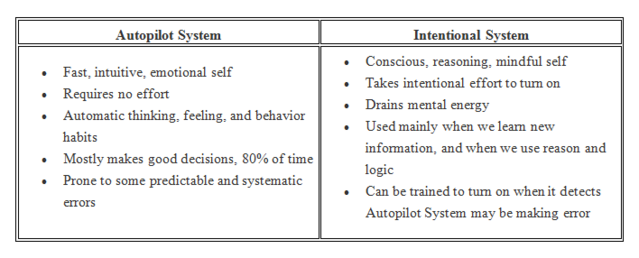The only things we can control in life are our thoughts, feelings and behaviors. If we can manage those, we can achieve our goals and gain success in life.
To have this level of control, we need to learn about the science-based patterns behind our emotions and thoughts, and how to manage them. If we know how our minds work, we can be intentional about influencing our thinking and feeling patterns. We can evaluate reality more clearly, make better decisions and improve our ability to achieve our goals. Thus, we gain greater agency and the quality of living intentionally.
How do our minds work? Intuitively, our mind feels like a cohesive whole. We perceive ourselves as intentional and rational thinkers. Yet, cognitivescience research shows that in reality, the intentional part of our mind is similar to a little rider on top of a huge elephant of emotions and intuitions.
Roughly speaking, we have two thinking systems. Daniel Kahneman, who won the Nobel Prize for his research on behavioral economics, calls them “System 1” and “System 2." But I think the terms “autopilot system” and “intentional system” describe them more clearly and intuitively.
The autopilot system corresponds to our emotions and intuitions. Its cognitive processes take place mainly in the amygdala and other parts of the brain that developed early in our evolution. This system guides our daily habits, helps us make snap decisions and reacts instantly to dangerous life-and-death situations (such as saber-toothed tigers) through the freeze, fight or flight stress response. While it helped us survive in the past, the fight-or-flight response is not a great fit for modern life.
We have many small stresses that are not life-threatening, but the autopilot system treats them like tigers. This produces an unnecessarily stressful everyday life experience that undermines our mental and physical well-being. Moreover, while the snap judgments resulting from intuitions and emotions might feel true because they are fast and powerful, they sometimes lead us in the wrong, in systemic and predictable ways.
The intentional system reflects our rational thinking and centers around the prefrontal cortex: the part of the brain that evolved more recently. According to recent research, it developed as humans started to live within larger social groups. This thinking system helps us handle more complex mental activities, such as managing individual and group relationships, logical reasoning, probabilistic thinking and learning new information and patterns of thinking and behavior.
While the automatic system requires no conscious effort to function, the intentional system takes deliberate effort to turn on, and it is mentally tiring. Fortunately, with enough motivation and appropriate training, the intentional system can turn on in situations where the autopilot system is prone to make errors, especially costly ones.
a
Here's a quick visual comparison of the two systems:

The autopilot system is like an elephant. It's by far the more powerful and predominant of the two systems.
Our emotions can often overwhelm our rational thinking. Moreover, our intuitions and habits determine the large majority of our lives, which we spend on autopilot mode. That's not a bad thing at all. It would be mentally exhausting to think intentionally about every action and decision.
The intentional system is like the elephant rider. It can guide the elephantdeliberately to go in the direction that matches that of our actual goals.
Certainly, the elephant part of the brain is huge and unwieldy. It is slow to turn and change, and it stampedes at threats.
But we can train the elephant. Your rider can be an elephant whisperer. Over time, you can use the intentional system to change your automatic thinking, feeling and behavioral patterns. In this way, you will become a better agent in terms of taking charge of your life and
reaching your goals.

Comments
Post a Comment